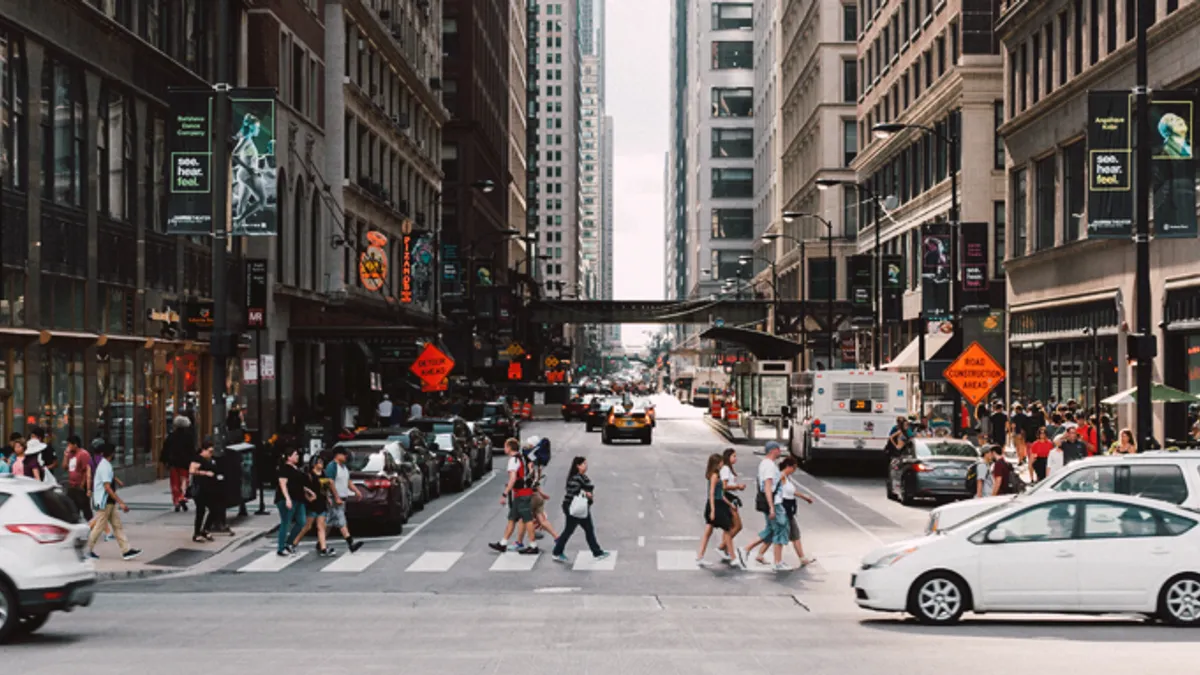Dive Brief:
- Without a universal curb standard, cities should not depend on the private sector to lead effective and equitable curb space management, says a new report from Transportation for America (T4A).
- In a series of principles released by the third cohort of its Smart Cities Collaborative (SCC), the group said curb management should be focused on serving all road users, not just those in cars. They also said it should serve those who are not connected to the digital network, in addition to serving people with disabilities, low-income residents, and residents who are Black, Indigenous and people of color.
- SCC added that curbside management standards should be easily transferable to a jurisdiction of any size, land use and density, and cities must rethink how they communicate about the value and use of the curb to their residents. In time, T4A officials said they hope the principles will lead to what they called universal curbside language and standards (UCLS).
Dive Insight:
These principles come after the coronavirus (COVID-19) pandemic forced a rethink for SCC's third cohort. Late last year, the group selected Bellevue, WA; Boston; and Minneapolis for a one-month pilot program to address curb management on at least one city block, with 12 to 15 peer cities slated to learn from their experiences. Coronavirus forced a cancellation of those pilots, and instead members of the SCC put together the principles, in a bid to help form universal standards and language.
Curb management has been a constant battle for cities as they look to deal with the influx of ride-hailing, food and e-commerce deliveries and a slew of other offerings, while also competing against single-occupancy vehicles, transit and other modes like dockless bikes and scooters, as well as pedestrians. The growth in delivery drivers has been especially pronounced this year during the pandemic.
Mae Hanzlik, a program manager at T4A and the report's primary author, said the equity principle is especially significant as the curb must be accessible to all. That could include UCLS having a standardized set of symbols or characters for agencies to use rather than plain text, and might also include reserving space for certain users or refining the infrastructure so it can better serve different needs.
"This is something that all cities are thinking about right now, or should be thinking about," Hanzlik said. "It's how they can prioritize their most vulnerable users and disadvantaged community members. What we're saying is, each city is going to define what equity means in their community differently. UCLS is a universal language and standards can be created allowing cities to be able to specify what equity means to them."
SCC also said that while private companies have valid ideas about curbside management and should be at the table, local public agencies should take responsibility as they are best placed to cater to all stakeholders.
Columbus, OH and Washington, DC have piloted loading zones with curb management platform CurbFlow and have seen success in reducing double parking and promoting smoother delivery procedures. Meanwhile, Sidewalk Labs-backed curb management and data firm Coord has worked to help cities optimize their curb space and piloted what it described as "smart zones" in four cities, while City Tech Collaborative launched its own solution in Chicago earlier this year.
Hanzlik said while private companies have a valuable perspective to offer, cities must not abdicate their curbside management responsibilities, because if private entities create a solution that is not informed by local priorities, it could be harder for cities to regulate as they try to prepare for new innovations, especially in transportation.
"What the curb really is, it is a public asset, and it is a public resource," Hanzlik said. "It should be shaped by the people who are in charge of managing the curb, which is our cities, or local entities, typically. And that really is the most important piece of it."
T4A said it hopes the principles will shape universal language and standards around curbside management, and that cities will take the opportunity to rethink how they communicate ways the curb can be used. Hanzlik said streamlining so-called "Christmas tree signs," which list the rules of the curb, time limits for parking and such, could be one way to ease that communication with residents.
"I think simplifying things and being very clear in communication is really important if we want to be able to manage the curb and be able to ensure that it can serve the number of different demands that are already pushing on it today," Hanzlik said.












